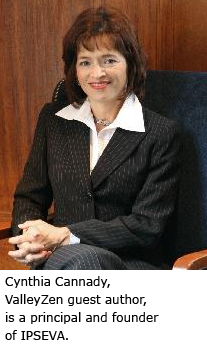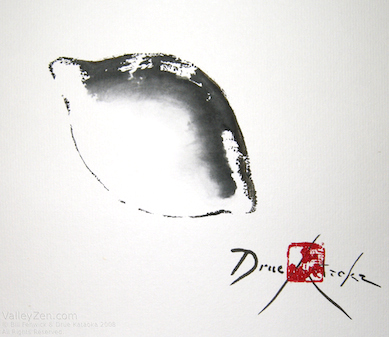Zen and Venn (Guest Post)
Zen theory and practice can help lawyers, technologists and businesspersons meet the fundamental challenge of negotiation of technology deals: finding the overlapping space in two distinct circles of interest, otherwise known as a Venn diagram.

Zen (or Chan in Chinese, Seon in Korean, Tzˆien in Vietnamese) comes from the Sanskrit word Dhyann which means “to contemplate deeply.” Many are familiar with Zen as an aesthetic value: the soothing simplicity of a stone and brushed sand garden. An ancient discipline, Zen is based on hundreds of texts and stories attributable to Gautama Buddha who lived in the 14th century, as well as Daoist and Hindu antecedents. Central to Zen are the concepts of self-study, mindfulness, compassion, and simplicity.
British mathematician and set theoretician John Venn described Venn diagrams in 1881. They symbolically represent the possible mathematical or logical relationships between sets (groups of things). The Venn diagram shows two or more overlapping circles with different coordinates, but which overlap in a lemon shape. Successful negotiation among two or more parties may be represented by a Venn diagram. Success is more likely if the lemon of common interest is large, and less likely if the lemon is puny. Mixing metaphors, the lemon shape represents the “common ground” between two businesses that exist on a business terrain where interests are not identical. Employing yet another phrase, the goal of negotiation is to identify that set of interests that provide a “win-win” to the parties.
As experienced negotiators know, finding the lemon shape of common interest is not always obvious, and can be a sour experience. Time in negotiation is often wasted on aggressive displays, marginally relevant arguments, and—the ubiquitous critique of lawyers—on fine legal points with little business consequence. Instead of expanding the nice lemon shape, many lawyers confine it to the proverbial head of a pin where angels dance. In partial defense of lawyers, businesspersons and scientists also engage in counterproductive negotiation behaviors.

Technology deal negotiation is particularly prone to misguided energy-wasting because of the complexity of the terms and conditions in these agreements. Unlike the sale of a physical good, where the dominant issue is price, technology deals involve intangible assets and multiple variables, including IP ownership, scope of licenses, exclusivity, royalties, future versions, service, indemnity, warranties, to name only a few terms. Zen principles can help.
Stay tuned for Part II of this post which will discuss Zen and Venn in Technology Deals.
Cynthia Cannady, the author of this post, is a principal and founder of IPSEVA. She is an expert in intellectual property strategy and technology licensing. She holds a juris doctor degree from Harvard Law School and a bachelor degree with honors from Stanford University. She is a member of the Bars of the State of California and the District of Columbia. Prior to founding IPSEVA, she served for six years as the Director of the Intellectual Property and New Technologies Division at WIPO (World Intellectual Property Organization) in Geneva, Switzerland.



Cynthia, I think you are making a very interesting point. In my experience in mergers & acquisitions, too many buyers focus on meeting seller price and term sheet expectation and fail to address the “soft issues” which can easily kill a deal.
Terms sheets and price negotiations are clearly a zero-sum game unless they are structured with some sort of an earn-out based on future performance. The “soft issues”, i.e. the seller’s strategic vision, approach to customers or focus on certain markets and technologies present an excellent opportunity for deal counterparties to identify their shared lemon area. Most buyers are aware that soft issuers are important but they fail to communicate a clear, targeted, and consistent message to the seller at the very first meeting. Hence, they often lose an opportunity to build credibility with a seller early on, long before confidentiality agreements, term sheets and purchase agreements drafts are exchanged.